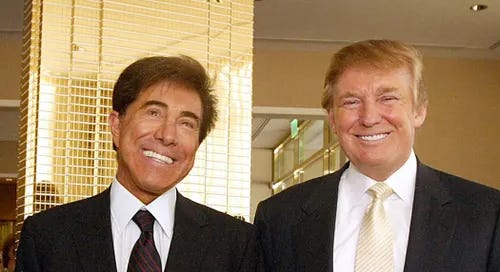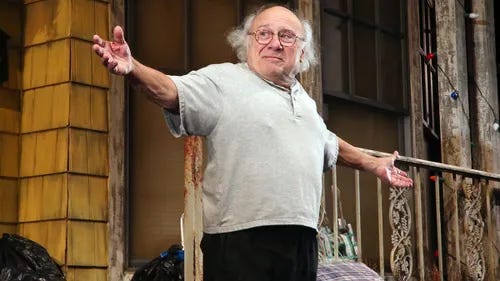Yes. It's all his fault. Kind of. Maybe. Here's what I mean. In the early 2000s, HBO was developing a movie focusing on the rivalry between Trump and Steve Wynn to build a casino in Atlantic City, N.J. Danny Devito, having previously directed a movie about Jimmy Hoffa and an adaptation of Matilda, was on board to helm the TV movie. Titled Trump vs. Wynn, this was going to be an epic clash of big business interests and even bigger public personalities. A surefire hit for the burgeoning TV network.
So, why didn't the movie get made?
Donald Trump, who usually has a thick skin for criticism, was not too pleased when he received word of this movie being in development. Afraid that the film would portray him as a crude and sleazy businessman, his lawyers sent HBO a letter threatening to sue the studio. Trump couldn't handle the idea of being portrayed negatively in the media. Jeffrey Auerbach, a media executive who initially brought the project to HBO, recalled, "HBO, to my wonderment and pleasure, nicely said, 'fuck off," as detailed in the book, It's Not TV, written by Felix Gillette and John Koblin. After all, making this movie violated no law as long as producers had "Based on a true story" somewhere in the credits. The story was fair game. Trump's talk of a lawsuit was nothing more than a scare tactic to protect his public image from scrutiny. This was clear even as he took a less adversarial stance on the movie in public interviews, saying, "I want to be played by a very handsome, very brilliant person." Steve Wynn competed with Trump's ego by suggesting George Clooney or Brad Pitt play him. Both actors had recently starred in the immensely successful Ocean's Eleven remake.
Public egos and threatened lawsuits be damned, the movie went into pre production. Offices were set up, and the casting process began. Christopher Walken was in talks to portray the future president, while Harvey Keitel would play Wynn. Neither ever officially signed on to the project. DeVito and his then-wife Rhea Perlman would also take on supporting roles in the movie. Then, it all fell apart on the morning that HBO would officially offer Walken and Keitel each $1 million to be in the movie. HBO programming executive Kary Antholis called Danny DeVito to talk about the film and its cast, only to learn that Devito had been at dinner with Trump the night before. What was said at that dinner? Probably only DeVito and Trump could tell you that. The result, though, was Devito backing out of the project altogether. He told Antholis, "Call me the next time you need a director for a movie that's about dead people."
Without DeVito in the director's chair, the movie fell apart and never got made. Donald Trump has always been very sensitive to how the public sees him, and this movie had a chance to change that. Those who would have watched the film would have seen a darker, more sinister side of the man who would become the free world's leader less than two decades later. Jeffrey Auerbach is quoted as saying, "Kary and I always laugh. We realize we could have saved America if we'd just made that fucking movie and people saw who Donald really was."
There you go. Everything bad that has happened over the last eight years is Danny DeVito's fault. Okay, that may be unfair. After all, Trump has become known as "Teflon Don." It still would have been interesting to see how this movie changed Trump's public reputation before he ever won the presidency. The irony is that DeVito became an outspoken opponent of Trump's 2016 campaign, and Steve Wynn became the finance chair for the Republican National Committee under President Trump's direction.
I don't know what to take from this story. Either I'm impressed that the power of movies scared “The Donald”, or concerned that he was able to kill this project and protect his reputation. Probably the latter. Unfortunately.






